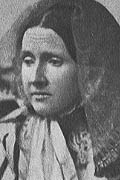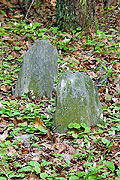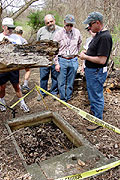|
|||
| Portmouth Asylum - An Example The Portsmouth Asylum is singled-out in Thomas Hazard's 1851 Report on the Poor and Insane in Rhode Island1 as an example warranting overhaul of social welfare laws in Rhode Island. The following are excerpts which directly mention the Portsmouth Asylum. Editorial comments or constructs are shown in [brackets]. To add further emphasis, the words "Portsmouth" and "Portsmouth Asylum" appear in bold italic text. The full text of the report may be downloaded from here. [Pages 13,14]
6 males 8 females 1 boy 7 years of age. 15 Total Replies to Queries. 1st. There are about sixty acres of land, worth $4,000, connected with the Portsmouth Asylum for the poor: the whole establishment, including buildings, is worth about $5,000. 2d. Do not know the money value of its products. 3d. The keeper's salary is $200 per annum. 4th. For the year 1849, the expense of the poor was about $30, in addition to the products of the farm. 6th. The Asylum is conducted under the direction of three Commissioners, who give no security for their behavior. 7th. The supervision of the Asylum is delegated by the town to the Commissioners. 8th. Do not know what is the annual sum paid by the town for the support of their poor. 9th. Fifteen has been the average number of paupers for the last two or three years, summer and winter. 10th. No fund or legacy has been given to the poor in Portsmouth. 11th. The pauper children go to the district school, under the direction of the Commissioners. 12th. Dr. Keith is hired by the Town Council to attend on the poor for $12 per year. 13th. No Bibles have been furnished the poor by the town. I understand that Bibles have been given to such of the poor as know how to use them, by individuals. Public religious meetings are held at the Asylum occasionally. Rule 14th. No one of the poor shall go off the farm without permission from the Commissioners or Keepers – every one who obtains their permission shall return in good order, at the appointed time; if any one is suspected of bringing strong liquors or stolen property into the said Asylum, or on the farm, the keeper shall search such persons, and if found guilty, shall be punished as the Commissioners, or any of them, may direct. 16th. In all cases of solitary confinement for criminal conduct, the person shall be debarred from seeing or conversing with any person, except the Commissioners, the Keeper, or the persons employed to supply their wants, and their food shall consist of bread and water; and shall be kept in confinement as long as the Commissioners, or any one of them may direct. 18th. If any person maintained in the Asylum, shall willfully deface walls, or break the windows of the house, or injure any of the premises; or shall disturb the house by conversing loud, or shall quarrel, abuse, or strike any of the family; or shall behave disrespectfully towards any of those having the care and charge of the house; or shall drink to excess, or be guilty of theft or embezzlement, or shall profanely curse and swear, or be guilty of lying, shall be put into the dark room and there kept as long as the Commissioners or any of them may direct. 20th. If any person capable of working, shall refuse or neglect to work, or shall be idle and will not perform the task for him or her prescribed, or is allotted; or shall spoil or waste any thing delivered to him or her, or shall violate any of the orders of the keeper or keepers, shall be punished as the Commissioners or any one of them may direct, I believe that it was a maxim of some ancient sage or philosopher - that, the government was the best, which gave equal protection to its citizens, without distinction of persons. If I understand the theory of our own republican institutions, they are sought to be based on this maxim. Our laws are not intended to be framed in reference to persons , but to things. It supposes the administrators of the law, to be deaf and blind to all but the facts relating to the subject before them. Under the same circumstances, the same judgment to be meted to the rich and the poor, and the little and the great. It is the maxim of our laws that the punishment shall not exceed the offence. The Constitution of our country declares "that cruel and unusual punishments shall not be inflicted." Now admitting the extremity of poverty to be a crime - in the name and behalf of the pauper poor of the State, in all seriousness, I respectively ask you as conservators of the rights and privileges of he people of Rhode-Island, to define what the punishment of that crime shall be. It seems there is one town, at least, in the State, who, in virtue of authority delegated by you to them to provide for the care of their own poor, have decided poverty to be a crime of so deep a dye, that any one found guilty of the offense within its jurisdiction, shall no longer be deemed worthy to partake of the inestimable privileges of an American citizen. Henceforth, such persons are taken from under the protection of the institutions of their country, and compelled to submit to laws made especially for their government, and of so severe a character, that for offenses so venial as not to entitle them to be reckoned even as misdemeanors in national or state jurisprudence, they are condemned to undergo punishments that would be deemed unusually severe for our State courts to impose for the commission of most flagrant crimes. The operation of these arbitrary laws are rendered still more galling from the fact, that their administration is solely entrusted to one person, from whose decision there is no appeal, and who is empowered to set totally irresponsible to any other authority; neither is he obligated to render any account of his acts to any earthly tribunal whatever. You will observe that in one short section of the laws passed by the town of Portsmouth for the government of their Asylum for the poor, there are thirteen offences enumerated, for the commission of any one of which, it is made the imperative duty of the commissioner to sentence the criminal to solitary confinement in a dungeon, there to be kept on bread and water during his pleasure. So completely are all the safeguards that have been reared for the protection of the rights and liberties of American citizens, annulled in this unmitigated despotism, that the keeper of the Asylum frequently becomes in his own person, accuser, witness, and executioner of the law. When it is considered that this Asylum is insulated from public inspection, that a great part of its inmates for many years past, have been insane and idiotic, and most of the remainder, old and decrepit persons, it will require neither testimony nor argument to convince men acquainted with human nature, that the poor of this town must have been subjected to great wrongs. - Neither could such men fail to perceive, that in case the keeper of the Asylum should happen to be a man of a tyrannical and ferocious character, that he would be likely soon to usurp all the powers of the despotism, and administer as well as execute the laws himself. That such a man might be guilty of the greatest enormities in a community over which he could exert so despotic a power, there can be no doubt. It will be observed that one offence thought worthy of solitary confinement during pleasure, is lying. By one of the rules it is made the duty of a commissioner or of the keeper to read the laws to the inmates of the Asylum once a month. It is to be presumed that if any person in the establishment should venture to make any demonstration of complaining of his or her treatment, that in reading the 18th section of the laws already quoted, a significant glance by the keeper to the rebellious pauper and thence toward the dark hole, would convey a hint sufficient to prevent any exposures. It seems to have become an established maxim with some people that all of the public poor are liars, and with such the keeper's word would doubtless be sufficient to convict any pauper of being guilty of that offence, and consequently a complaint entered to the visiting commissioner would most likely result in the complainant being sentenced to the dungeon for his temerity. Let no one suppose that this is an idle sketch of fancy, and that these laws are never executed. In a community, where a majority can be found to enact such laws, depend upon it individuals will be found to execute them; and that such have been found, not only to execute, but even to abuse them, I have not the least doubt. Turn not lightly from the contemplation of these outrages because the poor only are liable to suffer by them; we know not who may be poor. We know not but that our mothers, our wives, our sisters, our daughters, may yet become the inmates of a poor house; what then if, through the operation of such laws as these, they become subjected to a ruffian's lawless will; what if a widowed wife, or a gray haired mother, at some future day, rendered desperate by oppression, (which is said to make a wise man mad,) should, for daring to complain, be cast into a dungeon and there fed on bread and water, with only a plank to lie upon for days and nights together. And yet would not this be a fit retribution for those who, knowing of such things and having the power to remedy them, refused to do so? Why, it was precisely wrongs like these, that once kept the climax of human forbearance and drove a nation mad - that made all France to rise in mass and with gigantic fury, hurl from his throne their monarch to the grave, raze the fabric of the Bastile and tear its dungeons from the ground. The Bastile, once a word of fear throughout the world; its very name had power to chill the heart and make the blood to pause in terror; and yet, the victims of tyranny confined within its cells suffered none the more for the celebrity of their prison- house. The dungeon of Portsmouth has scarcely been heard of beyond the boundaries of that town, and yet its victims suffer none the less. The bread and water of the captive in the Bastile was probably as sweet as that given to the feeble old woman or the broken spirited old man in the dungeon of Portsmouth; the stone seat of the one, was no harder than that of the other; the darkness all the same. - What then conferred such terror on the name of the Bastile? It certainly was not the stone and mortar of which it was builded as other prisons are. No, it was that in its dungeons lay the victims of a tyrants will; there, condemned to suffer at his caprice, without trial and without law. It was this, and not the prison itself, that nerved with hate the nations arm, and fired that fierce volcanic burst of frenzy that deluged France with blood. It is but a few days since, that, in answer to inquiries I made with regard to the condition of a colored man, I have before alluded to, who was taken lately from the Butler Hospital and placed at the Asylum of the town of Portsmouth; that I understood the President of the Council of that town to say, - that this man was very well, but that on account of a habit he had of going to the closet and helping himself to bread and butter, he was then chained, it not being thought safe that he should use a knife, as he did in cutting the bread, &c. Still more recently, I understood the overseer of the poor of the same town to say, that this colored man was peaceable and inoffensive, but that he got in the way of the people engaged in the domestic concerns of the poor house, and that he was thereafter chained to keep him away. For the relief of such cases as this, I am satisfied that there is the most urgent need of some state legislation. In vain will ever be all appeals to the humanity of a community, the majority of which sanction and defend such abuses. For some years great efforts have occasionally been made by the more humane portion of the people of the town of Portsmouth, to relieve their insane poor, but without effect. They have not only been uniformly out voted in their town meetings, but it has been too evident that their exertions in behalf of the poor maniacs have only tended to rivit more firmly their chains. However divided on other subjects, all parties seem there to unite under the banner of oppression. It was on one of these occasions, when the question of relieving the insane poor was under discussion, that I heard a former Commissioner of the poor, in a town meeting in Portsmouth, declare in a loud and boasting voice, that he had himself once severely flogged an insane person at their Asylum; and to all appearances, the shamless avowal of his brutish exploit, excited he approbation rather than the disgust of the majority of the assembly. It was at this time that the most strenuous efforts were put forth for the relief of a young man by the name of Dennis, who had been brought from Providence, (where he had been at work at his calling, which was that of a carpenter,) a raving maniac, and not only chained at the Portsmouth Asylum, but absolutely baled, as it were, in sack-cloth. I remember, whilst he lay in this situation, putting an apple beside him, which he eat after the manner of a brute, by gnawing it as well as he could as it rolled about on the floor. The relations of this young man were among the most respectable and influential men in the town, and they made every exertion to procure his being sent to a curative Hospital. But it was all in vain. The god of Mammon was too strong for the angel of Mercy. It was some weeks or months after the failure of this effort to relieve poor Dennis, that I visited Portsmouth Asylum in company with that inestimable friend of humanity, Dorothea L. Dix, and the late lamented Anna A. Jenkins. Death was then about to relieve the sufferer. The strong man lay prostrate and powerless in its grasp. Life's contest, with its all conquering foe, was nearly over - I heard the fearful death-rattle in his throat - and I thought as I looked upon a Commissioner of the poor, then present, who had been active in opposing the removal of the dying man to a Hospital - that happy would it be for him, if, when the same pale messenger was sent to summon his spirit into the presence of a merciful but just God, that he might then be allowed to free himself from the guilt of the blood of his fellow creature, by the plea of ignorance. After stating that some years ago she saw the (then) keeper strike old Thomas Durfee, an insane man of 80 years of age, a full blow with his fist on the side of his bald head, which staggered him - because he happened to be in the way; and at another time, seeing old Hannah Lawton, a poor old crippled woman, lying on the floor unable to rise, without help; having been, as she told her, knocked down by the keeper - and a few more trifling incidents of a similar character, Mrs. Albro proceeded to state "that about six years ago, Mary Slocum, (an insane woman) struck my wrist with a fire hook, and shattered my wrist bone and knocked out my finger joint. I have suffered every thing with it; I do now suffer much at times. Mary Slocum used frequently to strike the people here - and once struck me on the side of the head with her fist and hurt me considerably, but I soon got over it. Mary was once jamming a child, about a year old, against a chair. I was afraid that she would kill it, and took it up; whereupon Mary seized a chair and struck me on the shoulder with it - on the same arm that she had before broken. My shoulder is still very lame in consequence of the blow - it is now nearly two years ago, since it was done. Mary came up one morning, where Miss Browning lay sick, and beat and hurt her considerably. Miss Browning died about six weeks or two months after this. I have suffered much for fear of the insane, and sometimes cannot sleep, for fear of being attacked by them. Last winter, I was in my room, which opens into the sitting room, where we usually sit, and I heard Mary Slocum attack Mrs. Cornell, an old woman of about 86 years of age. She beat her with a broom stick on the head, back, and arm, and bruised her arm badly and hurt the bone - so that she could never after that, dress or undress herself. She used to groan and complain much of her arm - she died about two weeks after the beating. She had (previously) been subject to spells of short breath, and seemed to fail fast after being beaten. I was told by them, who were at the house before I came, and who are now dead and gone, that Mary used to beat them and hurt them much. Mary Slocum once struck me at the table, on my hand with a knife, so as to make it bleed." On the same morning and after old Mrs. Cornell was so badly beaten, it so happened that I was at the Portsmouth Asylum, and I have no hesitation in saying that I believe her death was hastened by the beating she had received. Her arm was bound up and she appeared wild with excitement and fright and complained bitterly to me. This Mary Slocum was then chained, and I could liken the position she occupied in that helpless family to nothing better than that of a wolf which a shepherd should keep chained in a fold and which was occasionally let loose to worry and devour the sheep, thus keeping them in a constant state of terror. The occasion of my visit to Portsmouth Asylum at that time was to execute a commission which I had received from some excellent ladies in Philadelphia, to remove from the Asylum and place at board for life in a private family, at their expense, William R. Fales, one of the most remarkable and interesting young men with whom I was ever acquainted. For many years this young man had been afflicted with a rheumatic complaint to such a degree as not to be able to lie in any other position than on his side, neither he turn or move himself in bed without assistance. His limbs were wrenched and distorted in the most shocking manner, and there was scarcely a particle of flesh on them. He was in almost constant pain, which a great part of the time was excruciating; yet through all his suffering his faith in the mercy and goodness of God never forsook him. To the last moment of his life his countenance retained a highly intellectual and almost heavenly expression. Whilst lying in this state he managed to write with a pencil many letters and some essays, which since his death have been arranged and published by one of his female friends in Philadelphia, and altogether form an exceedingly interesting and instructive memoir. The sentiments expressed in some of his essays bear a striking resemblance to those of Fenelon, and seem to be breathed forth in the same gentle spirit. His mind was of the finest mould and of the highest order, and nothing but health and education was wanting to have rendered him one of the first of men. He was removed from the Asylum about a year since and placed in a family where he received every necessary attention, but at the expiration of about months he was visited with a complicated disease, of which he died, aged about 30 years. Gifted with an exceedingly sensitive mind and of a delicate physical organization, both rendered more keenly susceptible by a most painful malady, it may well be conceived how his sufferings must have been increased by the constant apprehension of being attacked, in his helpless and perfectly defenceless condition, by the insane. He used sometimes whilst at the poor house touchingly to remark to me that he passed many long and weary nights without sleep on account of excessive pain, and that when his pain abated he was sometimes kept awake by the ravings and babbling of an insane woman who occupied an adjoining room. |
 Dorothea Dix, an advocate for the insane, visited the Portsmouth Asylum
 Portsmouth Asylum cemetary markers, at head and toe, were not inscribed
 John Ort describes a well on the site of the Portsmouth Asylum. © 2002, William Saslow
|
| [Search!] | [Survey] [Planning] [Projects] [Outreach] | [What's New!] |
|
Copyright © 1999-2004, REWHC. All Rights Reserved 972 have visited |
||


